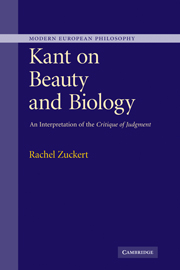Book contents
- Frontmatter
- Contents
- Acknowledgments
- Note on citations
- Introduction
- 1 The problem: The unity of the diverse
- 2 Reflective judgment and its principle: Preliminary remarks
- Part I Teleological judgment
- Part II Aesthetic judgment
- Introduction to Part II
- 5 Beautiful objects: Subjectively purposive form
- 6 Aesthetic pleasure: The feeling of subjective, projective temporality
- 7 The free harmony of the faculties: Purposiveness as the principle of aesthetic Beurteilung
- 8 The justification of aesthetic judgment: Purposiveness as the principle of reflective judging
- Conclusion
- Bibliography of works cited
- Index
6 - Aesthetic pleasure: The feeling of subjective, projective temporality
from Part II - Aesthetic judgment
Published online by Cambridge University Press: 22 September 2009
- Frontmatter
- Contents
- Acknowledgments
- Note on citations
- Introduction
- 1 The problem: The unity of the diverse
- 2 Reflective judgment and its principle: Preliminary remarks
- Part I Teleological judgment
- Part II Aesthetic judgment
- Introduction to Part II
- 5 Beautiful objects: Subjectively purposive form
- 6 Aesthetic pleasure: The feeling of subjective, projective temporality
- 7 The free harmony of the faculties: Purposiveness as the principle of aesthetic Beurteilung
- 8 The justification of aesthetic judgment: Purposiveness as the principle of reflective judging
- Conclusion
- Bibliography of works cited
- Index
Summary
In the previous chapter, I argued that Kant both adapts and criticizes the rationalist aesthetics of perfection, in claiming that the beautiful form of an object is purposive without a purpose: in aesthetic representation we unify heterogeneous properties as such, “as if” towards the purpose of identifying the object, yet we do not and cannot employ one overarching concept; thus we find our representation of the object merely subjectively formally purposive, or purposive without a purpose. As I suggested, such unity among properties is “what we find pleasing” in aesthetic experience, and in this chapter I turn to Kant's understanding of that pleasure, and, correspondingly, to his critical adaptation of the core claim of empiricist aesthetics, that aesthetic experience essentially involves pleasure. Though Kant concurs with this empiricist claim, he provides a radically different account of such pleasure from that assumed by the empiricists: aesthetic pleasure is neither to be understood as a mere sensation, nor (therefore) as the subject matter of empirical psychological judgments or generalizations. Rather, aesthetic pleasure is constituted by an a priori principle, that of purposiveness without a purpose. Aesthetic pleasure is purposive, I shall argue, in that it is an intentional representation with a formal structure of future-directedness, and it is purposive without a purpose (or, equivalently, I shall argue, disinterested) in that it is not so future-directed by virtue of its relation to a conceptually articulated purpose.
- Type
- Chapter
- Information
- Kant on Beauty and BiologyAn Interpretation of the 'Critique of Judgment', pp. 231 - 278Publisher: Cambridge University PressPrint publication year: 2007



